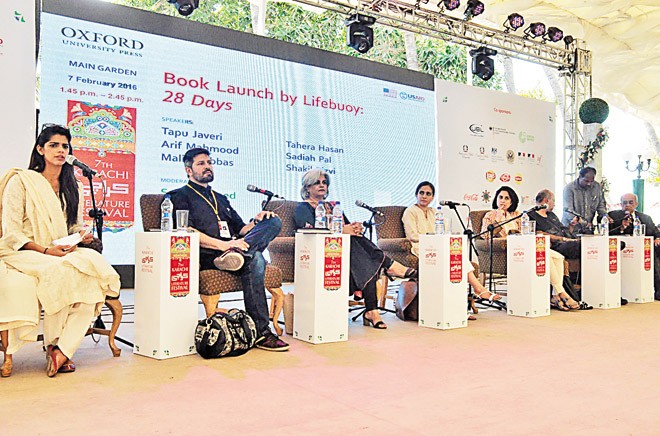
Instep reflects on the 7th edition of Karachi Literature Festival

On a bright, sunny Friday morning, the 7th edition of Karachi Literature Festival opened its doors to a curious and eager public, hoping to find humanity, color, and much more. The Beach Luxury hotel transformed for three days as speakers from in and around the country as well as guests from other countries descended to this beautiful, sea-facing venue. Armed officers, vigilantly spread in and around the Beach Luxury and security was at an-time high as one was greeted by police mobiles upon arrival.
The festival, though not without merits, had its share of highs and lows, which is to be expected. However, perhaps the single greatest question that plagues the festival after operating for over half a decade is how important and relevant are the conversations that take place.
A literary festival like KLF allows us to explore, discuss and debate topics that are crucial in helping, healing and saving our deteriorating social fabric. It must also be remembered that in a country with shrinking public spaces, a gnawing culture of terrorism (that has made attending school a matter of life and death) and an increasing disconnection between people, KLF’s existence is essential.
Highs
Consisting of book launches, panel discussions on subjects ranging from education to transgender rights, cinema, politics, art, poetry, history, liberal and performing arts, music and comedy, KLF 2016 gave attendees an opportunity to explore several subjects, both known and unknown.
Gleaming tributes were paid to Urdu literature giant Intizar Hussain who passed away just days before the festival. Like Saadat Hasan Manto, Intizar Hussain is a writer who can never be replaced nor forgotten. A panel session was in fact converted into a tribute event of sorts… And his absence loomed in the background along with the late Abdullah Hussain.
Several high profile speakers were scheduled to attend and though some were absent, others left a lasting impression on the audience. One such session belonged to Indian journalist Barkha Dutt who came equipped with her new book, This Unquiet Land. Easily one of the biggest attraction at KLF this year, Dutt left audiences in either shock or awe with her no-holds barred answers.Sanjay Rajoura and Saad Haroon gave people a chance to laugh and remember that humour can be used to reflect on society’s ailments and hypocrisy with their stand-up routines. A panel discussion aptly titled, ‘Laughter is the Best Medicine’ featuring the two comedians alongside writer and satirist Nadeem Farooq Paracha was equally engaging and pulled a huge audience.
Pakistani cinema’s new wave, the revival that we’re currently seeing also had its moment at KLF 2016 with a few panels dedicated to various cinematic themes. Among them was the session ‘Pakistani Cinema Strikes Back’ which helped in shedding a light on cinema issues ranging from the proliferation of television stars into cinema and the lack of variety as a result, parallel cinema, diversity in genres and the need for corporate sponsorship to fund films with a reminder that filmmakers are making films on passion and need funding to move forward.
The panel, ‘Transgender Rights: Are there any?" featured the inspiring story of Laxmi Narayan Tripathi, the author of Me Hijra, Me Laxmi and her triumphant story of fighting against all odds while the viewpoint of thrilling artists also had the audience enchanted with their breathtaking work that was on display for the duration of the festival. Artists like Hafsa Sheikh presented artwork that was inspired and captivating. Karachi Biennale Council shared its vision for Biennale 2017 while the genius of Imran Qureshi got its due during the panel ‘The Art of Now’; performances were made alive by the likes of Asif Sinan and others and who took to stage to add musical passion to the three-day event.
One of the most riveting panels belonged to Ismail Ka Urdu Sheher, the book-music album by Zohaib Kazi. Though Sara Haider was sorely missed in this session, other speakers like Kazi, Kamal Khan, Saad Irfan, Abbas Ali Khan and Omran Shafique made up for it.
Moderated by Ali Safina, the conversation served as an insider’s look at a project that merges music, science, space and art in a glorious manner. Photography also got a space as Amean J, Tapu Javeri and Arif Mahmood served on a panel and gave people a chance to understand the links between art and photography.
Lows
The number of stalls that greeted you as you entered the gates of Beach Luxury left a sour impression for no reason other than the fact that it felt like a mela without identity instead of a literary festival. And though audience participation, soaring every year, is in fact the point of KLF, this mela-esque creation diminished one’s experience on the whole.
One of the biggest pulls of KLF 2016, a panel featuring Nandita Das and Sarmad Khoosat simply didn’t happen because Das fell ill and couldn’t make it as a result. Anupem Kher’s controversial remarks due to lack of visa left a sour impression and as it turns out, it was essentially his own doing. By not applying for the visa, he made his trip impossible.
Several names were a no-show for one reason or another. This includes Meenu Gaur, Sara Haider, Ayesha Omar and several other notables who couldn’t make it. Their presence was missed but perhaps the biggest glaring issue at KLF is that most panels opted for the English language. This means that class warfare continues to haunt KLF. Despite pulling a huge audience, the festival is enveloped in elitism as language plays the role of a barrier. In the end, it must be remembered that for the audience to have the facility to truly engage with the ideas and discourse on offer, Urdu language should serve as the language of choice.